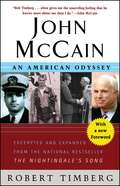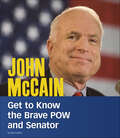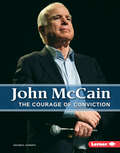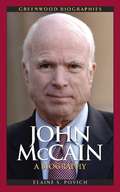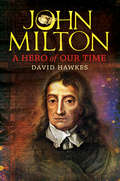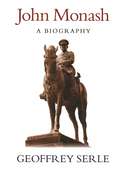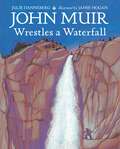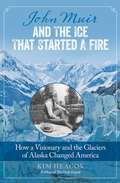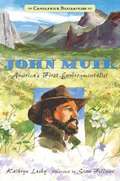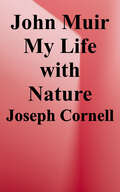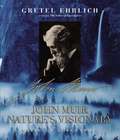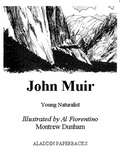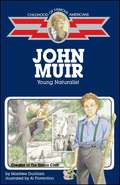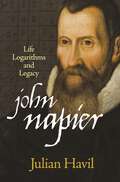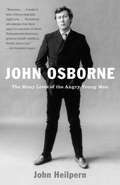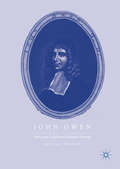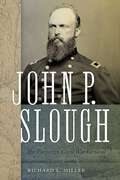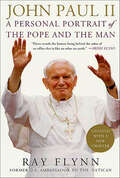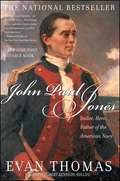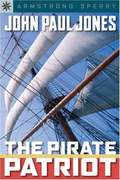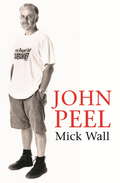- Table View
- List View
John McCain: An American Odyssey
by Robert TimbergRobert Timberg, an award-winning Washington journalist, is a 1964 U. S. Naval Academy graduate and a Marine veteran of the Vietnam war. He was The Baltimore Sun's White House correspondent during the Reagan presidency.
John McCain: Get to Know the Brave POW and Senator (People You Should Know)
by Dani GabrielBefore he was a senator, John McCain fought in the Vietnam War and served in the House of Representatives. He ran for president of the United States in 2008. Get to know the maverick who was willing to speak his mind.
John McCain: The Courage of Conviction (Gateway Biographies Ser.)
by Heather E SchwartzThis timely title examines the remarkable life and death of John McCain, from his time as a decorated war veteran to elder statesman. Accessible text and plentiful photos cover McCain's early life, his military career, his political legacy, and his 2017 diagnosis of brain cancer. Up-to-the-minute details round out this latest look at a uniquely American figure.
John Mccain: A Biography
by Elaine S. PovichJohn McCain's "maverick" streak and military-forged code of honor have coexisted uneasily at times with the demands of his political career and his determined pursuit of the presidency.
John Milton: A Hero of Our Time
by David HawkesJohn Milton — poet, polemicist, public servant, and author of one of the greatest masterpieces in English literature, Paradise Lost — is revered today as a great writer and a proponent of free speech. In his time, however, his ideas far exceeded the orthodoxy of English life; spurred by his conscience and an iron grip on logic, Milton was uncompromising in his beliefs at a time of great religious and political flux in England. In John Milton, David Hawkes expertly interweaves details from Milton's public and private life, providing new insight into the man and his prophetic stance on politics and the social order. By including a broad range of Milton's iconoclastic views on issues as diverse as politics, economics, and sex, Hawkes suggests that Milton's approach to market capitalism, political violence, and religious terrorism continues to be applicable even in the 21st century.This insightful biography closely examines Milton's participation in the English civil war and his startlingly modern ideas about capitalism, love, and marriage, reminding us that human liberty and autonomy should never be taken for granted.
John Monash: A Biography
by Geoffrey SerleA major Australian university and a great Victorian freeway are named after Sir John Monash, but many people—especially younger generations—know little about him. Monash was one of Australia's greatest men, and probably the greatest of its soldiers. The son of Jewish immigrants from Prussia, he graduated from the University of Melbourne in three faculties—Arts, Law and Engineering. He was a man of wide-ranging intellect, and especially devoted to literature, music, theatre, languages and Jewish scholarship. He achieved fame as a soldier—a citizen-soldier—in World War I. His baptism of fire occurred at Gallipoli, and he was almost the only senior allied general to emerge from the agony of the Western Front with his reputation virtually unspotted. Before the war, Monash pioneered the Australian use of reinforced concrete, then a revolutionary construction material. On his return, he became the first chairman of the State Electricity Commission of Victoria, putting his gift for leadership to harnessing Gippsland's huge brown coal deposits. Monash spent his energies lavishly on the public affairs of his native Australia and placed his immense prestige at the service of many great causes. Geoffrey Serle's award-winning and best-selling biography of John Monash is much more than a military study. It offers a revealing portrait of a confident leader and public figure, and of an intensely inward-dwelling and sensitive private person.
John Muir
by Margaret Goff ClarkA biography of the nineteenth-century naturalist, explorer, and writer who was influential in establishing our national park system.
John Muir
by Thomas LockerLaced with richly painted landscapes, this book brings readers the world and words of John Muir. This is the second book in a series of illustrated books by Thomas Locker that introduces readers to notable people who loved and wrote about the American land, especially about the value of wilderness.
John Muir Wrestles a Waterfall
by Julie DannebergThe now iconic figure John Muir, while living at the base of Yosemite Falls in California, ventures up the trail from his cabin one night and has a harrowing waterfall adventure. Back matter roots the story in Muir’s life’s work as a conservationist and naturalist.
John Muir and the Ice That Started a Fire: How a Visionary and the Glaciers of Alaska Changed America
by Kim HeacoxA dual biography of two of the most compelling elements in the narrative of wild America, John Muir and Alaska.John Muir was a fascinating man who was many things: inventor, scientist, revolutionary, druid (a modern day Celtic priest), husband, son, father and friend, and a shining son of the Scottish Enlightenment -- both in temperament and intellect. Kim Heacox, author of The Only Kayak, bring us a story that evolves as Muir’s life did, from one of outdoor adventure into one of ecological guardianship---Muir went from impassioned author to leading activist. The book is not just an engaging and dramatic profile of Muir, but an expose on glaciers, and their importance in the world today. Muir shows us how one person changed America, helped it embrace its wilderness, and in turn, gave us a better world.December 2014 will mark the 100th anniversary of Muir’s death. Muir died of a broken heart, some say, when Congress voted to approve the building of Hetch Hetchy Dam in Yosemite National Park. Perhaps in the greatest piece of environmental symbolism in the U.S. in a long time, on the California ballot this November is a measure to dismantle the Hetch Hetchy Dam.Muir’s legacy is that he reordered our priorities and contributed to a new scientific revolution that was picked up a generation later by Aldo Leopold and Rachel Carson, and is championed today by influential writers like E.O. Wilson and Jared Diamond. Heacox will take us into how Muir changed our world, advanced the science of glaciology and popularized geology. How he got people out there. How he gave America a new vision of Alaska, and of itself.
John Muir: America's First Environmentalist (Candlewick Biographies)
by Kathryn Lasky Stan FellowsFrom the meadows of Scotland to the farms of Wisconsin, from the swamps of Florida to the Alaskan tundra, John Muir loved the land. Born in 1838, he was a writer, a scholar, an inventor, a shepherd, a farmer, and an explorer, but above all, he was a naturalist. John Muir was particularly devoted to the high cliffs, waterfalls, and ancient giant sequoia trees that, through his careful influence, were set aside as one of the first national parks in America - Yosemite. Here is the life story of the man who, moved by a commitment to wilderness everywhere, founded the Sierra Club in 1892, a conservation group that carries on his crucial work to this day.
John Muir: My Life With Nature (A Sharing Nature With Children Book)
by Joseph CornellA biography of the man known as "father of America's national parks" and an influential conservationist, told in the first person, using Muir's own words.
John Muir: Nature's Visionary
by Gretel EhrlichIn this definitive photobiography, Ehrlich brings her award-winning grace and insight to the life of one of our nation's most prized environmental heroes--John Muir, a founder of the Sierra Club.
John Muir: Young Naturalist
by Montrew DunhamA founding father of the conservation movement in the United States, John Muir was born in Scotland and emigrated to Wisconsin when he was eleven. His boyhood passion for the wilderness of North America matured into a pathbreaking career, which included such triumphs as working with President Theodore Roosevelt to establish the National Parks Service, creating the first ever national park, Yosemite, and founding the Sierra Club. For today's eco-conscious kids, John Muir has become a hero.
John Muir: Young Naturalist (Childhood of Famous Americans Series)
by Montrew DunhamA founding father of the conservation movement in the United States, John Muir was born in Scotland and emigrated to Wisconsin when he was eleven. This easy-to-read fictionalized biography takes a look at Muir's life as young naturalist, destined to become one of America's first eco-heroes.
John Napier: Life, Logarithms, and Legacy
by Julian HavilThe most comprehensive account of the mathematician's life and workJohn Napier (1550–1617) is celebrated today as the man who invented logarithms—an enormous intellectual achievement that would soon lead to the development of their mechanical equivalent in the slide rule: the two would serve humanity as the principal means of calculation until the mid-1970s. Yet, despite Napier's pioneering efforts, his life and work have not attracted detailed modern scrutiny. John Napier is the first contemporary biography to take an in-depth look at the multiple facets of Napier’s story: his privileged position as the eighth Laird of Merchiston and the son of influential Scottish landowners; his reputation as a magician who dabbled in alchemy; his interest in agriculture; his involvement with a notorious outlaw; his staunch anti-Catholic beliefs; his interactions with such peers as Henry Briggs, Johannes Kepler, and Tycho Brahe; and, most notably, his estimable mathematical legacy.Julian Havil explores Napier’s original development of logarithms, the motivations for his approach, and the reasons behind certain adjustments to them. Napier’s inventive mathematical ideas also include formulas for solving spherical triangles, "Napier’s Bones" (a more basic but extremely popular alternative device for calculation), and the use of decimal notation for fractions and binary arithmetic. Havil also considers Napier’s study of the Book of Revelation, which led to his prediction of the Apocalypse in his first book, A Plaine Discovery of the Whole Revelation of St. John—the work for which Napier believed he would be most remembered.John Napier assesses one man’s life and the lasting influence of his advancements on the mathematical sciences and beyond.
John Osborne: The Many Lives of the Angry Young Man
by John HeilpernJohn Osborne, the original Angry Young Man, shocked and transformed British theater in the 1950s with his play Look Back in Anger. This startling biography-the first to draw on the secret notebooks in which he recorded his anguish and depression-reveals the notorious rebel in all his heartrending complexity. Through a working-class childhood and five marriages, Osborne led a tumultuous life. An impossible father, he threw his teenage daughter out of the house and never spoke to her again. His last written words were "I have sinned." Theater critic John Heilpern's detailed portrait, including interviews with Osborne's daughter, scores of friends and enemies, and his alleged male lover, shows us a contradictory genius--an ogre with charm, a radical who hated change, and above all, a defiant individualist.
John Owen
by Ryan M. Mcgraw"The Foundation of Communion with God" introduces readers to the Trinitarian piety of John Owen (1616-1683).
John P. Slough: The Forgotten Civil War General
by Richard L. MillerJohn Potts Slough, the Union commander at the Battle of Glorieta Pass, lived a life of relentless pursuit for success that entangled him in the turbulent events of mid-nineteenth-century America. As a politician, Slough fought abolitionists in the Ohio legislature and during Kansas Territory&’s fourth and final constitutional convention. He organized the 1st Colorado Volunteer Infantry after the Civil War broke out, eventually leading his men against Confederate forces at the pivotal engagement at Glorieta Pass. After the war, as chief justice of the New Mexico Territorial Supreme Court, he struggled to reform corrupt courts amid the territory&’s corrosive Reconstruction politics.Slough was known to possess a volcanic temper and an easily wounded pride. These traits not only undermined a promising career but ultimately led to his death at the hands of an aggrieved political enemy who gunned him down in a Santa Fe saloon. Recounting Slough&’s timeless story of rise and fall during America&’s most tumultuous decades, historian Richard L. Miller brings to life this extraordinary figure.
John Paul II: A Personal Portrait of the Pope and the Man
by Ray FlynnUnlike any other pope, John Paul II has reached out, creating dialogue or creating uproar, but always striving to unite the human community. Drawing on years of personal interaction with the Pope, and on his unique understanding of the intersection of religion and politics, Flynn, with co-authors Robin Moore and Jim Vrabel, shows how John Paul II changed the papacy, perhaps forever.
John Paul Jones: Sailor, Hero, Father of the American Navy
by Evan ThomasRelive the American Revolution in this gripping biography of sailor John Paul Jones, remembered as the father of the American Navy.
John Paul Jones: The Pirate Patriot
by Armstrong SperryNewbery Medalist Armstrong Sperry tells the exciting story of the man who led a rag-tag continental navy to victory at sea.
John Peel
by Mick WallA tribute biography of the hugely popular DJ and broadcaster John PeelJohn Peel was born in Cheshire in 1939 and, after National Service, he eventually went into broadcasting while travelling in America, where his Liverpool accent convinced them he must know the Beatles, and he was even present when Lee Harvey Oswald was shot. In 1967 he returned to the UK and joined Radio One at its start. His late-night radio shows were cult listening for music fans of all ages, and many bands admit that without his support, they would never have made it.While Radio One changed, he remained a constant factor in its schedules, and in 1998 he was awarded the OBE for his services to broadcasting. It was in that year that he also began his multi-award-winning show Home Truths on Radio Four. Mick Wall tells the story of arguably the most influential man in the history of British rock music, speaking to those who knew him well to build up a complete portrait of this hugely popular figure.
John Peel
by Mick Wall'Excellent ... paints an affectionate portrait of this unpretentious, humorous presenter who seems to have been loved by everyone who met him' SUNDAY TIMES'A leisurely stroll through the life of an "irreplaceable man" - [a] thoughtful, well-paced portrait' OBSERVERA tribute biography of the hugely popular DJ and broadcaster John PeelJohn Peel was born in Cheshire in 1939 and, after National Service, he eventually went into broadcasting while travelling in America, where his Liverpool accent convinced them he must know the Beatles, and he was even present when Lee Harvey Oswald was shot. In 1967 he returned to the UK and joined Radio One at its start. His late-night radio shows were cult listening for music fans of all ages, and many bands admit that without his support, they would never have made it.While Radio One changed, he remained a constant factor in its schedules, and in 1998 he was awarded the OBE for his services to broadcasting. It was in that year that he also began his multi-award-winning show Home Truths on Radio Four. Mick Wall tells the story of arguably the most influential man in the history of British rock music, speaking to those who knew him well to build up a complete portrait of this hugely popular figure.
